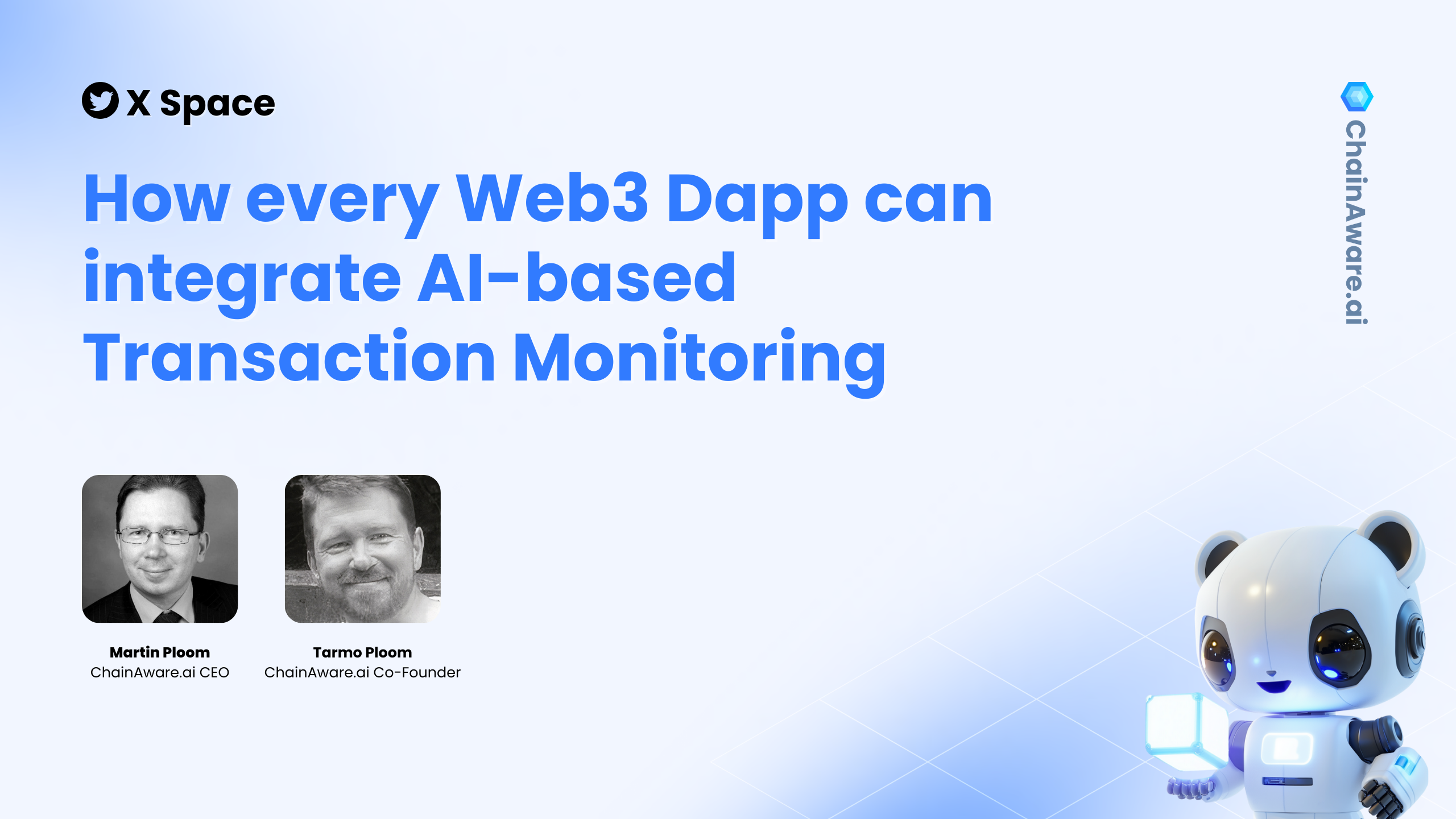While blockchains promise transparency on a transactional level, anonymity among participants can lead to rampant scams, rug pulls, and social engineering. Below is a summary of their insights into why AI-based wallet auditing is crucial for establishing trust in Web3—and how ChainAware’s Wallet Audit addresses this need.
Listen the X-Space: https://x.com/ChainAware/status/1860312972482023702
Web2 vs. Web3: Why Trust Matters
In traditional (Web2) scenarios—like online retail or banking—users rely on well-established credit scoring systems, identity verification (KYC), and legal recourse (contracts, courts). In business-to-business (B2B) contexts, for example, companies run credit checks, sign contracts, and know who they are dealing with. Credit card companies and banks also invest heavily in fraud prevention, ensuring customers can safely transact without constantly worrying about scams.
By contrast, Web3 operates in an anonymous environment. You know someone only by their wallet address, not by their name or credit history. Social engineering and impersonation abound.
Scammers can reuse or abandon wallet addresses at will, and new users often learn the hard way about bad actors in the system. Without any feedback loops, scammers see that negative actions go unpunished, which incentivizes further fraudulent behavior.
The Missing Element
Although blockchains solve the “transaction trust” problem by validating transactions through consensus algorithms, they do not solve the human-to-human trust issue. Understanding who you can trust (or not) based on an address is a major blind spot that holds Web3 back from broader adoption.
The Social Psychology of Anonymity
Research in social psychology shows that unethical behaviors rise when participants remain anonymous and receive no feedback from peers. If someone can act without accountability—especially in an environment where fraudulent tactics can be profitable—they will often pursue bigger and bolder scams.
In Web2, the presence of real-world identities, credit scores, and other verification systems reduces the reward for fraud, establishing strong social norms against bad behavior. The challenge: How can we bring an equivalent trust layer to Web3—without breaking the fundamental principle of user anonymity?
Introducing AI-Based Wallet Auditing
ChainAware’s AI-Based Wallet Audit seeks to fill this trust gap. Here’s how it works:
- Analyze Transaction History: Every on-chain transaction is rich with data. By examining this data, AI models can discern patterns that reveal user behavior—such as fraudulent tendencies, risk appetite, frequency of trades, or prior involvement in rug pulls.
- Predict Future Behavior: Rather than simply noting past scams, AI-based analytics can predict whether an address is likely to engage in fraud or rug pulls before it happens.
- Generate a Trust Profile: The outcome is a “wallet audit” that shows if a user address is high or low risk, how experienced they are, and whether they’re likely a borrower, lender, trader, or gamer. This provides the behavioral transparency that Web3 currently lacks.
- Shareable Audit Link: Users can then sign their wallet address and share a unique link, proving they truly control that address. This link reveals the AI-generated profile so that others can gauge trust levels, risk profiles, and relevant on-chain actions—without requiring KYC documents or real-world identities.
Why This Matters
- Reduces Fraud Incentives: Scammers who build a history of bad behavior will see their addresses scored poorly, discouraging re-use of that address.
- Promotes Positive Social Norms: As soon as participants realize that a negative history (e.g., failed scams, suspicious activity) follows them, many will adjust their actions to maintain a favorable on-chain reputation.
- Enables Fully Anonymous Yet Trust-Rich Interactions: No need for personal details or government-issued IDs. A user’s on-chain track record itself is a verifiable, decentralized reputation.
Beyond Static KYC: Dynamic, AI-Driven Trust
Traditional KYC-based blockchain networks (often called permissioned blockchains) haven’t caught on with the broader crypto community. They impose paperwork and identity checks that many see as antithetical to decentralization. Moreover, KYC alone doesn’t reveal whether someone will commit fraud tomorrow.
In contrast, AI-based wallet audits deliver a far more powerful trust mechanism by focusing on real-time and predictive behavior. Users remain anonymous but become publicly accountable for how they act on-chain.
Empowering All Participants
In typical Web2 systems, only businesses or financial institutions could run credit checks. With ChainAware’s free-to-use wallet audits, anyone from project founders to everyday users can evaluate addresses in seconds.
Establishing Positive Feedback Loops
- For Good Actors: Individuals who consistently act in trustworthy, transparent ways will build on-chain credibility they can leverage for collaboration, borrowing, or community-led activities.
- For Bad Actors: Since malicious addresses can be quickly detected, scammers must create new addresses repeatedly losing the benefits of any “legitimate” history. Over time, the costs of malicious behavior outstrip the rewards.
AI and Blockchain for Real Mainstream Adoption
Just as Web2 became mainstream by reducing fraud through credit checks and real-time transaction monitoring, Web3 can do the same. AI-driven wallet audits close a critical gap in decentralized systems, bringing trust and accountability to a frontier known for anonymity.
Conclusion
Building trust in Web3 requires more than just consensus algorithms. While the blockchain ensures transaction-level validity, it doesn’t address whether participants themselves are trustworthy. AI-based wallet audits offer a dynamic, real-time approach to verifying on-chain reputations—giving the ecosystem a powerful defense against fraud, rug pulls, and social engineering.
By making detailed, free-to-use audits available to everyone, ChainAware.ai aims to empower users, projects, and investors to decide, at a glance, who merits their time, capital, and collaboration. Instead of relying on permissioned chains or cumbersome KYC, Web3 participants can share AI-based wallet reports that highlight their behavior and intentions.
In short, an AI-powered trust layer brings Web3 closer to mainstream adoption, helping create a safer, more welcoming ecosystem one address at a time.







